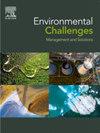脱碳的日本:核能和环境税在减少二氧化碳排放中的作用
Q2 Environmental Science
引用次数: 0
摘要
二氧化碳(CO2)排放是导致环境恶化的主要原因,而环境恶化与气候变化和全球变暖直接相关,并威胁着生态系统的持续生存能力。从化石燃料生产的广受欢迎的电力中发现的二氧化碳是必须减少的主要成分,以实现全球气候稳定。因此,本研究旨在研究日本核能(NE)、环境税(ET)和二氧化碳排放之间的长期联系,同时纳入1994-2022年的经济增长(GDP)。本研究采用非线性自回归分布滞后(NARDL)方法,对核能和环境税的正冲击和负冲击进行了准确的分析。结果表明:(1)日本东北地区减少了两种冲击下的环境退化。(二)ET以负冲击正向影响环境污染。(iii)国内生产总值对环境恶化有有利影响。此外,NARDL估计的结果和稳健性检查的结果是一致的。根据手头的证据,日本的环境排放可以成为提高环境质量的有益工具,而不是增加预算资本的工具。本文章由计算机程序翻译,如有差异,请以英文原文为准。

Decarbonizing Japan: The role of nuclear energy and environmental taxation in mitigating CO2 emissions
Carbon dioxide (CO2) emissions are the primary contributor to environmental deterioration, which is directly linked to changes in climate and worldwide heating and threatens the ecosystem's continued viability. CO2, which is found in the sought-after power produced from fossil fuels, is the primary component that must be mitigated to attain global climatic stability. Therefore, this research aims to study the long-term link between nuclear energy (NE), environmental tax (ET), and CO2 emissions in Japan while incorporating economic growth (GDP) during 1994–2022. The current study uses the nonlinear autoregressive distributed lag (NARDL) method to obtain accurate results regarding the positive and negative shocks of nuclear energy and environmental taxes. The results show that (i) NE in Japan decreases environmental decline in both shocks. (ii) ET positively affects environmental pollution in negative shock. (iii) GDP has beneficial effects on environmental deterioration. Additionally, the findings of the NARDL estimates and the results of the robustness checks are consistent. According to the evidence at hand, ET in Japan could become a beneficial tool for enhancing environmental quality instead of a tool for increasing budget capital.
求助全文
通过发布文献求助,成功后即可免费获取论文全文。
去求助
来源期刊

Environmental Challenges
Environmental Science-Environmental Engineering
CiteScore
8.00
自引率
0.00%
发文量
249
审稿时长
8 weeks
 求助内容:
求助内容: 应助结果提醒方式:
应助结果提醒方式:


